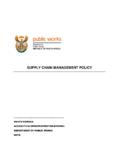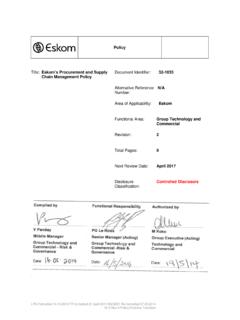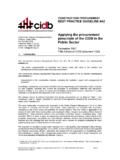Transcription of DUBE TRADEPORT CORPORATION F3 SUPPLY CHAIN …
1 I SCM POLICY DUBE TRADEPORT CORPORATION F3 SUPPLY CHAIN management POLICY 2015 Document number: CEO-SCM-0014 Revision: DD-001/2014 Signature Author: Sibusiso Mkhize Designation: Senior Manager: SCM Reviewed By: Ayesha Swalah Designation: Chief Financial Officer Recommended for Audit Committee Approval By: Saxen Van Coller On behalf of EXCO Designation: Chief Executive Officer Approved By: Shadrack Khumalo Designation: Chairperson Audit and Risk Committee Effective Date: 1 November 2014 Review Date: 31 October 2015 Next revision date: This policy must be reviewed within 12 months of its current effective date or earlier if dictated by circumstances or a change to legislation.
2 Ii SCM POLICY TABLE OF CONTENTS 1. Policy Statement/Preamble .. 1 2. Purpose .. 1 3. Objectives of the Policy ..1 4. Definition .. 1 5. Abbreviations .. 5 6. Legal Framework .. 6 7. Applicability .. 6 8. Policy 6 Disclosure of Interest .. 6 SUPPLY CHAIN management Unit .. 7 Demand management .. 8 Compilation of List Prospective Suppliers .. 9 Acquisition management .. 9 Preferential Procurement .. 17 Committee System for Competitive Bids .. 17 Appointment of Consultants .. 21 Deviation from and ratification of procurement process ..21 Urgent and emergency cases .. 22 Unsolicited Bids.
3 24 Subscriptions and Exemptions ..25 Combating of Abuse of the Procurement System .. 25 Logistics management .. 26 Disposal management .. 26 Risk management .. 27 SUPPLY CHAIN Performance management .. 27 Prohibition of Awards ..27 Ethical Standards .. 28 Irregular Expenditure .. 29 Resolution of Disputes, Objections, Complaints and Queries .. 29 Reporting of Procurement Information .. 30 Compliance with CIDB .. 30 Public Private Partnership .. 30 Access to Information .. 30 9. Termination .. 31 10. Responsibility Framework .. 31 11. Information & Education .. 33 1 SCM POLICY SUPPLY CHAIN management POLICY 1.
4 Policy Statement / Preamble The Public finance management Act, 1999 (Act of 1999 ), as amended, provides that the Dube TRADEPORT CORPORATION (DTPC) has a duty to take effective and active measures to be financially efficient, effective, transparent and economical through its SUPPLY CHAIN management (SCM) processes. 2. Purpose The purpose of this policy is to regulate the SUPPLY CHAIN management functions and systems of DTPC. 3. Objective To provide a framework to implement the provisions of section 217 of the Constitution of the Republic of South Africa in order to: Implement a policy that is fair, equitable, transparent, competitive and cost effective and complies with all the applicable provisions of the Public finance management Act (PFMA).
5 Ensure consistency with the legal framework for SCM. Ensure that the DTPC s strategic objectives are achieved. 4. Definitions Term Definition Accounting authority Means the authority which is accountable in terms of section 49 of the PFMA in particular, read with section 49(2) (a) of the PFMA. Acquisition management Acquisition management is the process of procurement of goods and services and includes inter alia the following: Identification of preferential policy objectives; Determination of market strategy; Application of depreciation rates; Application of total cost of ownership principle; Compilation of bid documentation, including conditions; Determination of evaluation criteria; 2 SCM POLICY Term Definition Evaluation of bids and tabling of recommendations; Compilation and signing of contract documents.
6 Contract administration All applicable taxes Includes value added tax, pay as you earn, income tax, unemployment, insurance fund contributions and skills development levies Assets Is a resource controlled by DTPC as a result of past events and from which future economic benefits or service potential are expected to flow to DTPC. Bid A written offer submitted in a prescribed or stipulated form, in response to an invitation. Broad-Based Black Economic Empowerment Means the economic empowerment of all black people including women, workers, youth, people with disabilities and people living in rural areas through diverse but integrated socio-economic strategies that include, but are not limited to (a) increasing the number of black people that manage, own and control enterprises and productive assets; (b) facilitating ownership and management of enterprises and productive assets by communities, workers, cooperatives and other collective enterprises.
7 (c) human resource and skills development; (d) achieving equitable representation in all occupational categories and levels in the workforce; (e) preferential procurement; and (f) investment in enterprises that are owned or managed by black people. B-BBEE status level of contributor The B-BBEE status received by a measured entity based on its overall performance using the relevant scorecard contained in the Codes of Good Practice on Black Economic Empowerment, issued in terms of section 9 (1) of the Broad-Based Black Economic Empowerment Act. Collusive Bidding/ tendering Collusive bidding/tendering (or bid rigging) occurs when business, that would otherwise be expected to compete, secretly conspire to raise prices or lower the quality of goods and/ or services for purchasers who wish to acquire goods and /or services through a bidding process.
8 Bid rigging is, therefore, an agreement between competitors not to compete. Competitive Bid A bid in terms of a competitive bidding process 3 SCM POLICY Term Definition Consultant A professional service provider. Contract The written agreement. Contractor Any person whose bid or quotation has been accepted for the execution of work. Delegation A written authorisation by a delegating authority to a delegated body to act in his stead. Disposal The doing away with items that are no longer needed. This includes redundant and obsolete items. EME Exempted Micro Enterprise as defined in the B-BBEE Act Goods Those raw materials or commodities which are available for general sale Irregular expenditure Irregular expenditure means expenditure, other than unauthorised expenditure, incurred in contravention of or that is not in accordance with a requirement of any applicable legislation, including the PFMA.
9 Long Term Contract A duration period exceeding one year Preferential Procurement Legislation The Preferential Policy Framework Act, 2000 (Act No 5 of 2000) and its associated Preferential Procurement Regulations of 2011 Procurement The acquiring of goods, services and engineering and constructions works, or the acquiring of capital assets by means of a purchase, lease or donation; and procuring has a similar meaning Professional services Services provided by a qualified Professional within the scope of the practice of accounting, architecture, land surveying, landscape architecture, or Professional engineering and shall also include, but not be limited to, land surveyors, Geotechnical Engineers, interior design Services, and Soils Engineers etc.
10 Public Private Partnership A Public Private Partnership (PPP) means a commercial transaction between an institution and a private party in terms of which the private party: Performs an institutional function on behalf of the institution; and/or Acquires the use of state property for its own commercial purposes; and Assumes substantial financial, technical and operational risks in connection with the performance of the institutional function and/or use of state property; and 4 SCM POLICY Term Definition Receives a benefit for performing the institutional function or from utilising the state property, either by way of: o Consideration to be paid by the institution which derives from a revenue; or o Charges or fees to be collected by the private party from users or customers of a service provided to them; or o A combination of such consideration and such charges or fees.








